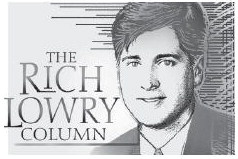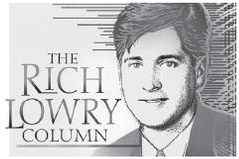The last time an unfit incumbent ran for re-election


There’s a tried and true method for a White House to deal with a seriously ailing president — lie about it.
The American public, of course, didn’t know the truth about Woodrow Wilson’s condition after his stroke, nor about the extent of JFK’s health difficulties. Meanwhile, FDR’s dire condition was kept from the public when he was running for a fourth term that he had no business attempting. He died 82 days after his inauguration.
Joe Biden is the most unfit incumbent president running for another term in office since that 1944 campaign. That is not to say that he’s going to — God forbid — shed this mortal coil soon after the 2024 election, but that we should be mindful of the lessons of 80 years ago. To paraphrase Winston Churchill, a president’s inner circle is prone to believe that the chief executive is so precious that he must be protected by a bodyguard of lies.
Few self-respecting physicians with the trust of the president are going to betray it. By early 1944, FDR had been diagnosed with a life-threatening condition, namely “acute congestive heart failure.” An examining physician called his health status simply “God-awful.” Nonetheless, the White House rolled out FDR’s doctor in September to pronounce the president’s health “perfectly OK,” with “absolutely no organic difficulties at all.” He said the president, who had experienced alarming weight loss, had just decided to shed some pounds and that he’s “proud of his flat — repeat F – L – A – T — tummy.”
Journalistic defenders can be trusted to attack and shame anyone who mistrusts the official story. Pro-Roosevelt writer Marquis Childs called the wellfounded rumors about FDR’s health a “wicked business,” and “the vilest kind of fear campaign.” The problem wasn’t FDR’s underlying condition, but the malignancy of his enemies: “Some people hate the president so much that the wish is father to the thought that his health is seriously undermined.”
Sound familiar? Of course, the political allies will always do their duty. Harry Truman, recently selected as FDR’s new vice presidential nominee, told reporters after a lunch with the president that he’s “still the leader he’s always been, and don’t let anybody kid you about it.”
Truman told a friend, in contrast, that the president’s “hands are shaking and he talks with considerable difficulty.” According to Truman, FDR was “just going to pieces” physically, and he said he was like “a phonograph record played at the wrong speed.” This wasn’t an unusual reaction. People around Roosevelt were in great fear of his dying, yet no one let on. FDR himself, who demonstrated an almost-admirable lack of curiosity about his own health, still knew how he felt, and wasn’t going to let voters know. He warned, “Hysterical last-minute accusations or sensational revelations are trumped up in an attempt to panic the people on election day.”
Uh-huh. FDR did have reserves of energy that were enough to overcome the murmurings about his health, but not the fact that they were true.
Perhaps Roosevelt can be forgiven more than most for his deceptions since — as a giant of American statesmanship who was ably managing a world war — it’s understandable that he might consider himself an indispensable man. Yet, it was madness how irresponsible he was about the inevitable succession. In “Ascent to Power,” his forthcoming book on this period, David L. Roll writes, “Truman continued from page
began his accidental presidency utterly unprepared. FDR made no effort to bring him up to speed on current foreign relations and domestic issues, nor did Truman insist on being informed by FDR or staff.”
The fact is that it’s never a convenient time for an administration to be honest about a president’s serious health problems; it can only hurt him and help his adversaries.
At the beginning of his term, Biden’s boosters, hopefully and absurdly, compared him to FDR. But it may be in exhibiting the same reflexes as the legendary Democrat in 1944 that the comparison is most apt.
Rich Lowry is editor of the National Review.
Synd., Inc.






out of
Posted on